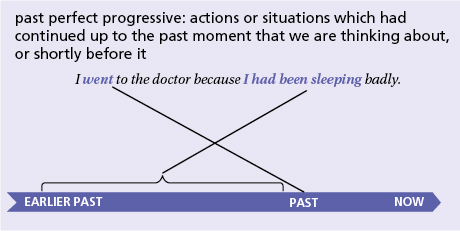Past perfect progressive
Forms
had been + -ing
- I had been working.
- Where had she been staying?
- They hadn’t been listening.
For double letters in words like sitting, stopping, (see here).
Use
We use the past perfect progressive to talk about actions or situations which had continued up to the past moment that we are thinking about, or shortly before it.
- At that time we had been living in the caravan for about six months.
- When I found Emily, I could see that she had been crying.
- I went to the doctor because I had been sleeping badly.

how long? past perfect progressive, not past progressive
We use a past perfect progressive, not a past progressive, to say how long something had been happening up to a past moment.
- We’d been walking since sunrise, and we were hungry. (not
We were walking since sunrise …) - When she arrived, she had been travelling for twenty hours. (not
… she was travelling …)
For the difference between since and for, (see here).
Progressive and simple: differences
Progressive forms are mostly used to talk about more temporary actions and situations. When we talk about longer-lasting or permanent situations we prefer simple forms. Compare:
- My legs were stiff because I had been standing still for a long time.
- The tree that blew down had stood there for 300 years.
Progressive forms generally emphasise the continuation of an activity; we use simple tenses to emphasise the idea of completion. Compare:
- I had been reading science fiction, and my mind was full of strange images.
- I had read all my magazines, and was beginning to get bored.
Some verbs are not normally used in progressive forms (see here), even if the meaning is one for which a progressive form would be more suitable.
- I hadn’t known her for very long when we got married. (not
I hadn’t been knowing her …)